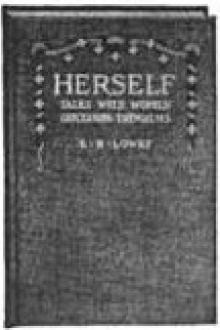Herself by Edith Belle Lowry (red novels txt) 📕

- Author: Edith Belle Lowry
- Performer: -
Book online «Herself by Edith Belle Lowry (red novels txt) 📕». Author Edith Belle Lowry
The menopause or change of life is the end of the child-bearing period of a woman's life. The average age at which it occurs is forty-six, although there is a great difference as to this. In some women it has been known to occur as early as the thirtieth year, while in others it does not come until the fifty-fifth year. As a rule, a woman who commences to menstruate at an early age continues to do so until a late age, while with a woman who commences to menstruate late, the change comes early. At this period of a woman's life, there are numerous changes taking place in the body. The ovaries and uterus atrophy or shrink in size, and cease to functionate. The nervous system is being readjusted to meet the changed conditions. One symptom of the approach of this period is irregularity in menstruation; sometimes several periods are missed, then the menstrual flow appears normally for several months and then disappears again. Often the woman complains of hot flashes, cramps in the limbs and other parts of the body. These are caused by the attempts to readjust the nervous system to the altered conditions. A great many women worry unnecessarily, for there is no especial danger at this time unless the body has been neglected previously and a diseased condition is present. But the body needs a little extra care, just as it did at puberty. So many women break down their health by worrying at this period over what might happen. The best plan for every woman, as soon as she perceives the approach of this period, is to go to a reliable physician and have a thorough examination. Then if there are any neglected tears or chronic inflammations they can be corrected and danger removed. If a person were to cross a deep lake and had any doubts regarding the worthiness of the vessel provided for his use, he would be very foolish if he did not have a trained boat-builder examine his vessel and repair any weak places. It is just as important for a woman about to cross this period of her life to go to a trained repairer of bodies and have him correct any weak places.
The various changes taking place consume so much of the woman's strength that she requires an extra amount of rest and cannot use up as much energy in working as at other periods of her life. The ordinary woman does not realize the need of extra rest during this period and so continues her usual work. Then the extra drain on her nervous system shows itself in various forms. The disturbances sometimes are productive of so much discomfort and so often are exaggerated beyond physiological limits that the patient is impelled to seek relief and often requires a physician's attention. Puberty or the period of development extends over several years, so the menopause or period of atrophy extends over a period of from three to five years. If a woman relaxes and allows the changes to proceed naturally she need have no cause to worry, but she must remember that rest from continual strain is necessary during this period. Freedom from care, relaxation of physical and mental effort, regular periods of complete rest once or twice a day, a reduction of the diet and regulation of the bowels should be the first principles of treatment. Then—do not worry but occupy the mind with happy thoughts.
So much of the suffering among women is unnecessary, being due to the neglect of the little things, so much ill health can be relieved by attention to a few simple hygienic measures, that I think it wise to describe some of the most common disorders of the female organs, and to explain their symptoms so that you would not ignorantly neglect them, if you should be so unfortunate as to contract any.
The most common diseases of the female organs may be classed as displacements, inflammations and tumors.
On account of its lack of strong attachment, the womb is very easily displaced. When from any cause the womb is congested and heavy the extra weight stretches the supporting muscles and ligaments, which then allow it to fall out of place. It also may be displaced by a sudden fall, by jumping or other strenuous exercise. As the womb normally is heavier at the menstrual period than at any other time and as there is a natural congestion then, it is more easily displaced at that time than during any other part of the month. This is one reason why one should be careful not to take strenuous exercise at the menstrual period.
The most common displacement, or the most common way for the womb to tip, is backwards and at the same time it usually falls downward. You remember, the rectum is directly back of the womb, so, if the womb is tipped backwards, it presses against the rectum. This tends to prevent the feces, or bowel movement, from passing out naturally and helps to produce constipation. The womb, pressing against the rectum, also presses on the blood vessels which are very numerous there. This pressure on the blood vessels prevents the blood from leaving them. If it is held there, it causes the blood vessels to dilate in order to be large enough to contain it. We call this enlarged portion of the vein a blood tumor. These tumors or dilated blood vessels of the rectum are called hemorrhoids or piles. I will explain these more thoroughly when I talk to you about constipation.
The womb may tip forward, pressing on the bladder and causing a frequent desire to urinate. More rarely it is tipped to one side. It then tends to pull on the ovaries and produce pain and various nervous symptoms.
The womb may fall downward, pressing against both the bladder and rectum and dragging the ovaries and tubes out of their natural positions. Sometimes it even protrudes from the vagina. Any falling or displacement of the womb pulls on the tubes and ovaries, often producing an inflammation. This inflammation should not be allowed to continue, as it may become serious, even extending to the peritoneum and producing peritonitis. The nerves of the uterus are very closely connected with the spinal nerves, therefore, any displacement reacts through them and may produce headache and backache, which are the common accompaniments of any uterine disorder.
KNEE-CHEST POSITION
One of the most simple and yet efficacious treatments to correct a displacement downward and backward is to assume the knee-chest position for a few moments morning and evening after the clothing has been removed. In the knee-chest position, the patient kneels on the bed, then bends forward until her chest touches the bed; the back slopes down and the thighs should be at right angles with the bed. This position allows the various organs to fall forward and toward the upper part of the body, the pressure on the uterus is relieved and it assumes its natural position. This treatment, persisted in, will relieve nearly every case which has not some other disorder connected with it. If every woman would assume this position for a few minutes once or twice a week, just before retiring, she would be greatly benefited; for the majority of women have a slight falling of the womb, which then presses on the rectal and other nerves causing various nervous symptoms.
The womb and ovaries are surrounded by a dense network of nerves and blood vessels, making them very liable to congestion. Tight clothing or improperly fitted clothing causes pressure and interferes with the circulation. I believe that a large percentage of the objections to the corset originated from women wearing improperly fitted corsets which pushed the organs out of place. A corset fitted to the wearer is not injurious and serves as a support. Overwork, catching cold and excesses may produce a congestion which is one stage of inflammation. The most common symptoms of inflammation of the womb are pain in the pelvic region, a dull backache, especially across the hips, and a vaginal discharge called leucorrhœa (whites). Any leucorrhœa shows a disordered condition which should be corrected. It may be simply of a catarrhal nature, due to pressure or cold, or it may indicate a more serious condition, as the presence of one of the black plagues. Whenever a woman notices a vaginal discharge, it is a wise plan to go at once to a reliable physician, find out what is the cause and nature and then take measures to correct it. In the beginning a very little treatment, such as hot douches, may be all that is required, while if untreated the condition may become serious, as you will understand when I explain about the black plagues.
Any disorder of the uterus or ovaries reacts through the nerves upon other parts of the body and may produce various symptoms such as general weakness, headaches and backaches. This drain on the system often is shown by dark circles under the eyes, pale skin and a drawn, haggard expression. All these tend to rob a woman of her charm of physical excellence, and none of us wish to lose that; for it is natural for all women to wish to appear attractive.
One of the most common of the so-called female disorders, which seems to be the lot of the majority of women, is dysmenorrhœa or painful menstruation. This is not a disease in itself, but the symptom of various disorders. A woman in normal health should not suffer at her menstrual period; so if she does suffer it shows there is something wrong. The natural thing for anyone to do who had dysmenorrhœa would be first to find the cause of this pain and then take measures to correct it. It may be due to displacements, inflammations or tumors; it may be due to a contraction of the mouth of the womb which does not dilate sufficiently to allow the menstrual discharge to flow freely. It may be due to neuralgia or rheumatism of the uterus or ovaries. Pain always indicates an unnatural condition. It is the cry of tortured nerves. The cause should be determined by a competent physician and then measures taken immediately to restore the normal condition.
One who suffers from dysmenorrhœa should try to plan her work so that she may rest the first day of her menstrual period, and, if possible, the preceding day. Absolute rest in bed at this time is beneficial. A hot sitz bath, hot foot bath or hot vaginal douche taken just previous to the commencement of the period will aid in relieving the congestion and thus lessen the pain. After the flow has started hot foot baths and hot applications to the abdomen may be used. Hot drinks also may be taken, but one should not get in the habit of using any drug at this time. Hot ginger tea will do as much good as one prepared with some habit-forming drug. Many of the remedies advertised as a cure for this condition are composed chiefly of alcohol, and, although they may give a temporary relief, the benefit is not permanent. Careful attention to diet and exercise, with regular hours of sleep, are essential points to be considered if one would be





Comments (0)